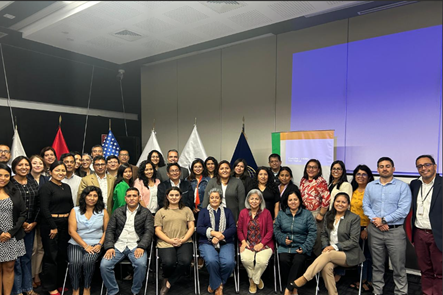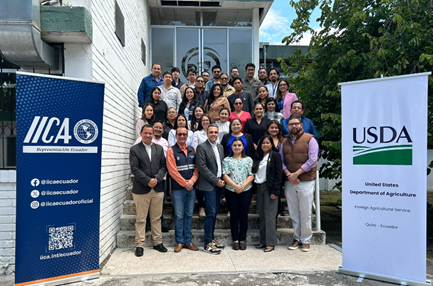The different agencies and organizations were encouraged to set up work teams and strategic partnerships for the nationwide rollout of the new risk-based inspection model.

Lima and Quito, May 15, 2024 (IICA). Workshops on risk-based food inspection systems were held in both Peru and Ecuador in order to strengthen food security in the Andean region. The workshops were carried out under the Promotion of Agricultural Trade in Latin America and the Caribbean (PATLAC) project, financed by the Foreign Agricultural Service of the United States Department of Agriculture (USDA/FAS) and the United States Agency for International Development (USAID), with technical and logistical support from the respective US embassies and the Inter-American Institute for Cooperation on Agriculture (IICA).
The meetings took place on April 23 and 24 at Peru’s Ministry of Foreign Trade and Tourism (MINCETUR), and from April 30 to May 1 at the facilities of Ecuador’s Plant and Animal Health Regulation and Control Agency (AGROCALIDAD).

In the workshops, Peru’s National Fisheries Health Agency (SANIPES) and Environmental Health Bureau (DIGESA), and Ecuador’s National Agency for Sanitary Regulation, Control and Surveillance (ARCSA) and AGROCALIDAD, presented the progress made with their risk-based inspection models.
The objective of these models is to modernize food safety management and the inspection of establishments, making both more efficient and aligned with the risk analysis principles of the Codex Alimentarius.
The participants in the meetings, which were targeted at representatives of Peruvian and Ecuadoran industry and academia, included Fernando Sampedro, a speaker and expert from the University of Minnesota; Sonia Allauca, a USDA/FAS official; and Susana Miranda, an IICA specialist in agricultural health and food safety and quality (AHFS).
The different agencies and organizations were encouraged to set up work teams and strategic partnerships for the nationwide rollout of the new risk-based inspection model.
The organizers pledged to continue furnishing technical assistance through virtual sessions, to equip the government entities of the two countries with the tools required to validate the models.

More information:
Institutional Communication Division.
comunicacion.institucional@iica.int











